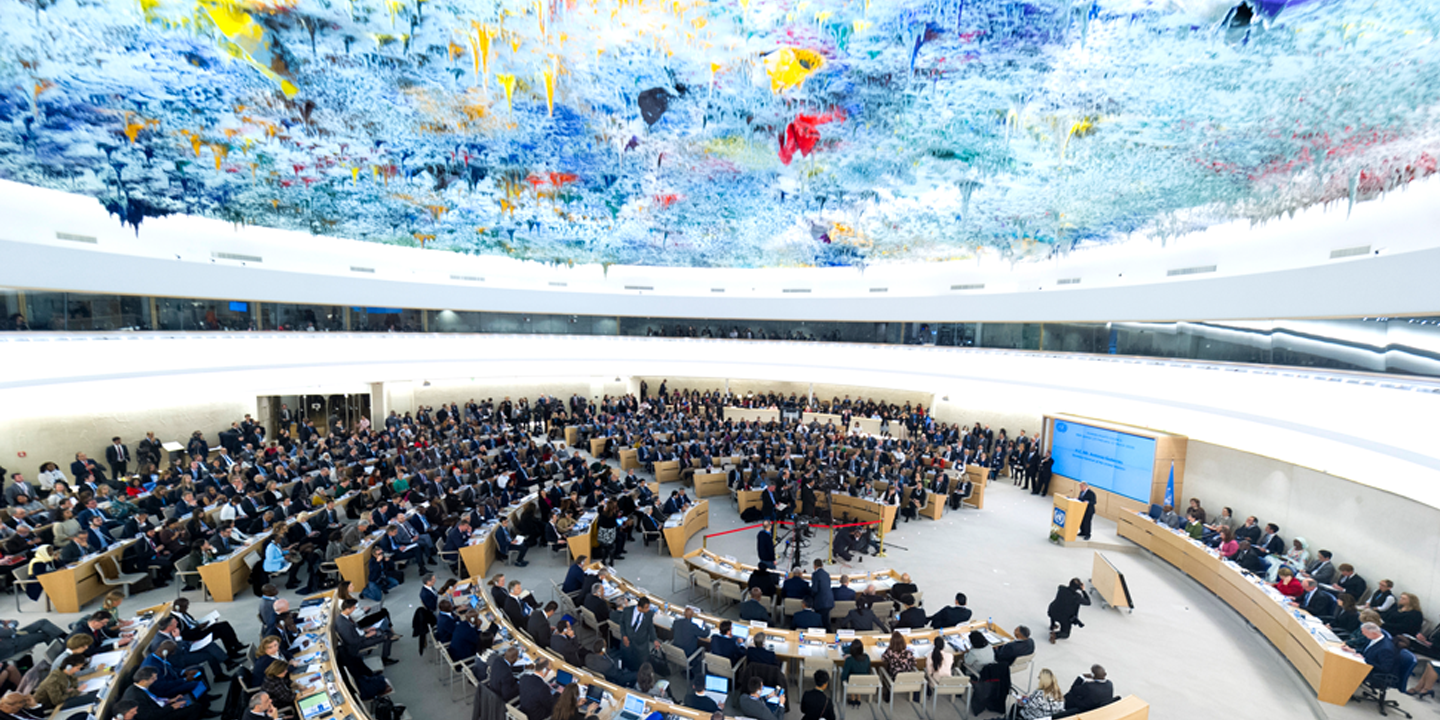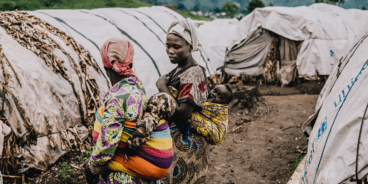

Atrocity Prevention and Outcomes of the Human Rights Council’s 48th Session
The 48th regular session of the UN Human Rights Council (HRC) was held in Geneva between 13 September and 11 October 2021. As the primary international human rights body, the HRC has the capacity to prevent and respond to mass atrocity crimes, as systematic violations and abuses of human rights can be an indicator of potential genocide, war crimes, crimes against humanity or ethnic cleansing. The summary below highlights major outcomes and relevant dialogues from the 48th session as they relate to the Responsibility to Protect (R2P) populations from such crimes. During the session Luxembourg delivered two statements on behalf of the Group of Friends of R2P.
RESOLUTIONS
A/HRC/48/L.1 Technical assistance and capacity building in the field of human rights in the Central African Republic
Strongly condemning all human rights violations and abuses against civilians in the Central African Republic (CAR), the HRC called upon the government, political and religious leaders and civil society to prevent incitement to violence, including on ethnic and religious grounds. The HRC encouraged the government of CAR to continue its cooperation with the Special Prosecutor of the Special Criminal Court to ensure that those responsible for international crimes, regardless of their status or affiliation, are identified and brought to justice. The Council renewed the mandate of the Independent Expert on the situation of human rights in CAR for one year and requested the Independent Expert provide an oral update at its 50th session and to submit a written report at its 51st session. The HRC further decided to organize a high-level interactive dialogue at its 49th session to assess the human rights situation, particularly the reconciliation process and guarantees of non-repetition. The resolution also recalled that “the authorities of the Central African Republic have the primary responsibility to protect all populations in the country from genocide, war crimes, ethnic cleansing and crimes against humanity.” The resolution was adopted without a vote.
A/HRC/48/L.2 Technical assistance and capacity building in the field of human rights in the Democratic Republic of the Congo
The HRC expressed concern about the deteriorating security and human rights conditions in the eastern part of the Democratic Republic of the Congo (DRC), as well as continuing violations committed against women and children, including sexual and gender-based violence. The HRC welcomed the report of the Team of International Experts on the situation in Kasai and decided to renew Team’s mandate, extending their investigations beyond the Kasai to the entirety of the DRC. The Council requested the team present a final report during an interactive dialogue at the HRC’s 51st session and to provide an oral update at its 49th session. The HRC further requested the High Commissioner to provide technical assistance to the government to support the judicial authorities in investigating allegations of human rights violations and abuses and to support the government in its efforts to establish a national commission on transitional justice. The Council requested the High Commissioner present an oral update at its 49th session and submit a comprehensive report at its 51st session. The resolution was adopted without a vote.
A/HRC/48/L.6 Technical assistance and capacity building for Yemen in the field of human rights
The HRC expressed deep concern at violations of International Humanitarian Law (IHL) and violations and abuses of International Human Rights Law (IHRL) in Yemen, including sexual and gender-based violence, recruitment of children, abduction of political activists, violations against journalists, killing of civilians, prevention of access for relief and humanitarian aid, persecution on the basis of religion or belief, cutting of electricity and water supplies, and attacks against hospitals and ambulances. The Council called on all parties to the conflict to respect their obligations under international law and urged the government of Yemen to take measures to end impunity for all alleged violations and abuses of international law. The HRC requested the High Commissioner continue to provide capacity-building and technical assistance to the government of Yemen and technical support to the National Commission of Inquiry (CoI) to ensure that it continues to investigate allegations of violations and abuses committed by all parties to the conflict in line with international standards. The resolution also requested the High Commissioner present a written report on the implementation of technical assistance at its 51st session. The resolution was adopted without a vote.
A/HRC/48/L.10 Situation of human rights in the Syrian Arab Republic
Expressing its deepest concern of the recent findings of the CoI on the Syrian Arab Republic that the situation of human rights has worsened for many Syrians over the past year, the HRC reaffirmed the importance of establishing and supporting appropriate processes and mechanisms to achieve justice, reconciliation, truth and accountability for violations and abuses of international law. The HRC demanded all parties to immediately cease torture and other cruel, inhuman or degrading treatment or punishment, including sexual and gender-based violence, in places of detention, and to cease the use of involuntary or enforced disappearance or kidnappings. The HRC demanded that all parties desist immediately from any use of chemical weapons. The resolution also demanded that “the Syrian authorities meet their responsibility to protect the Syrian population” and expressed grave concern about the tens of thousands of missing and disappeared persons. The resolution was adopted by a vote of 23 in favor, 7 against and 17 abstentions.
A/HRC/48/L.15/Rev.1 Assistance to Somalia in the field of human rights
The HRC recognized efforts by the Federal Government of Somalia to strengthen the promotion and protection of human rights through various ministries and their engagement with the international human rights system, including cooperation with the Independent Expert on the situation of human rights in Somalia. However, the HRC remained concerned by reports of violations and abuses of human rights, including the unlawful recruitment and use of child soldiers and children in armed conflict, killing and maiming, rape and other sexual and gender-based violence. The resolution renewed the mandate of the Independent Expert for a period of one year and requested that the expert work closely with the government to implement its national and international human rights obligations, as well as recommendations accepted in the context of the Universal Periodic Review. The HRC further requested that the Independent Expert report to the Council at its 51st session and to the General Assembly at its 77th session. The resolution was adopted without a vote.
A/HRC/48/L.19/Rev.1 Situation of human rights in Burundi
Expressing appreciation for the work of the CoI on Burundi, the HRC deplored the persistent refusal by the government to cooperate with the CoI. The HRC recognized recent progress in the field of human rights and rule of law, but condemned violations and abuses, including extrajudicial killings, enforced disappearances, arbitrary arrests and detention, acts of torture and other cruel, inhuman or degrading treatment or punishment, sexual and gender-based violence, intimidation and harassment of members of opposition political parties, civil society representatives, peaceful protesters, human rights defenders, journalists and other media workers. The HRC decided to appoint a Special Rapporteur to monitor the situation of human rights in Burundi and build upon the work of the CoI. The resolution requested that the Special Rapporteur present an oral report at the HRC’s 50th session and submit a comprehensive written report at its 51st session and to the General Assembly at its 77th session. The HRC further requested the High Commissioner to ensure that information and evidence collected by the CoI are consolidated, preserved and made accessible and usable for ongoing and future accountability efforts. The resolution was adopted by a vote of 21 in favor, 15 against and 11 abstentions.
A/HRC/48/L.24/Rev.1 Situation of human rights in Afghanistan
Expressing deep concern for the human rights implications of the security situation in Afghanistan, the HRC recalled the existing obligations of Afghanistan under IHRL as well as its status as a State Party to the Rome Statute of the International Criminal Court. The HRC condemned and called for an immediate end to all violations and abuses of human rights and violations of IHL in Afghanistan, including discrimination against women and girls. The Council also reaffirmed that human rights, democracy and the rule of law create an environment to promote development, protect individuals from discrimination and ensure equal access to justice for all. The HRC decided to appoint a Special Rapporteur to monitor the situation of human rights in Afghanistan and requested the Special Rapporteur submit a written report at its 51st session and to the General Assembly at its 77th session. The resolution was adopted by a vote of 28 in favor, 5 against and 14 abstentions.
A/HRC/48/L.25 Technical assistance and capacity building to improve human rights in Libya
The HRC strongly condemned all acts of violence in Libya, particularly those that constitute violations and abuses of human rights and violations of IHL, including unlawful detentions, abductions, enforced disappearances, torture, alleged extrajudicial killings, and intimidation or harassment of and violence against journalists, media workers and members of civil society. The resolution called upon the Government of National Unity and the international community to support victim-centered transitional justice efforts, as well as efforts to identify, protect and process mass graves to promote accountability and provide justice to families of missing and disappeared persons. The HRC renewed its request for OHCHR to provide more comprehensive and sustainable technical assistance and capacity-building to the Libyan judicial authorities. The Council also extended the mandate of the Fact-Finding Mission for Libya for nine months and requested the mission present a follow-up report of its findings at its 49th session, with the participation of the Special Representative of the Secretary-General for Libya, to be followed by an interactive dialogue. The HRC further requested the mission present a comprehensive report at its 50th session. The resolution was adopted without a vote.
Related Content


